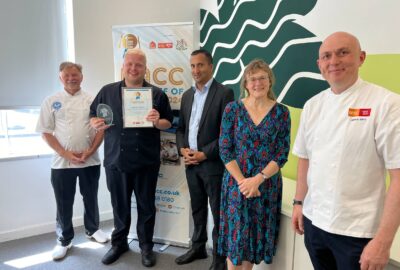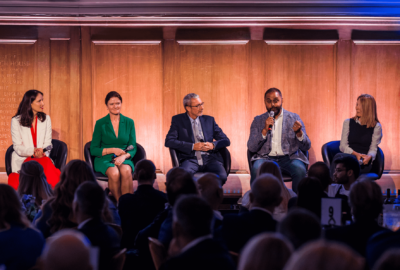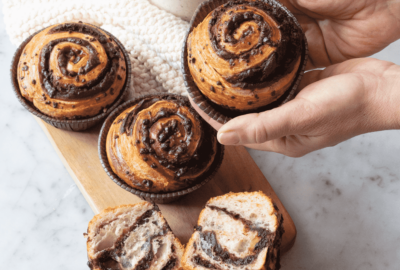Paul Ainsworth is giving Rick Stein a run for his money with an array of award-winning eateries in the Cornish gastronomic haven of Padstow, including the Michelin starred Paul Ainsworth at No. 6. His latest ventures include The Mariner’s pub, which won Best Gastropub at the Estrella Damm Top 50 Gastropubs this year, and Caffè Rojano, a New York-inspired Italian diner.
Please tell us about the food scene in Padstow and what drew you to the area.
When I was younger, what originally drew me to the area was the nice beaches and beautiful sunsets, but I’m really proud of how Padstow’s food scene has grown into what it is today. Rick Stein originally put it on the map as a great foodie destination, and his restaurants are still the place to go for amazing locally-caught fresh fish. It’s been great to see the food scene grow over the last few years because we’ve got such amazing produce, with top quality meat and great vegetables, and there’s now so many great restaurants doing amazing things with them.
You’ve been quoted before as saying “hospitality is in your veins”. What do you mean by this?
I grew up in a B&B owned by my parents. They built it up from a small five-room venue to a really sophisticated space that was ahead of its time in the 80s. Our family home was the business and so I grew up in an environment that taught me to appreciate hard work and truly understand the value of money.
You have worked with some incredible chefs.Who did you most admire and what is the best piece of advice that person gave you? That’s the best question i’ve ever been asked! I’d have to say Gordon Ramsay, who pulled me aside and one day said ” Paul, it’s much better to be an a****** that to be ignored”. What he meant by this, in a classic Gordon way, is that learning from your mistakes is the most important way to grow as a chef and if you’re not being noticed then you’re not going to be learning as much as you can.
What has been your proudest professional moment and why?
We’re so grateful as a team to have won some very impressive awards, but the thing I’m most proud of is winning the Michelin star at No. 6. It felt like everything we’d been doing at the restaurant had been leading up to that moment, and it’s an achievement that will stay with me forever. Having the star feels like wearing a badge of honour every single day, and I’m extremely proud.
I recently read that you’d helped out with school meals in your local primary school. What is your opinion of school dinners? The local primary school reached out to us to help improve their meals as they were outsourcing their school meals to another company and they were only spending a shocking 60p per child per meal. Along with other local chefs like Rick Stein, we came in and started teaching the kids about eating well and using good produce and we did things like starting a vegetable patch at the school. There’s still so much work that be can done, though! I think it’s really important to teach children about eating well from a young age.
The Paul Ainsworth Academy is training the chefs of the future. How can we encourage more young people to join the industry?
Getting young people involved in the future of hospitality is so important. We work closely with the young people in our local area to show them that cooking and becoming chefs is a career option that they might not have otherwise considered. We take on a lot of apprentices in all of our of kitchens and the guys work really hard to make them feel part of the family and help them to develop their skill – and it’s a lot of fun for everyone involved!
Last year saw the launch of your new cookery school and Chef’s Table. What’s the ethos behind both ventures and how have they been received?
Ultimately the ethos comes through the name, Mahé – it’s about beginnings. Mahé is an island in the Seychelles where my mum was born, and where my dad met my mum; it’s where it all began. A cookery school and chef’s table is an opportunity to see ingredients in their rawest form and then see how you can turn even the simplest ingredients like flour, eggs, olive oil and salt into fresh pasta and then go on to make the most amazing ravioli with it. We wanted to create cookery courses that feel more like an experience, and less like a classroom.
Finally, who’s the culinary king of Padstow?!
[Laughing] I’ve got to respect my elders, so Rick Stein will always be the king!
And now for three questions that we ask all of our Leading Lights…
- What are your three kitchen secrets? When frying eggs, give the egg a gentle shake before cracking open. It’ll ensure the yolk is perfectly centred and works every time. If you ever buy a truffle, keep it stored in risotto rice ensuring it’s well wrapped. The flavour will absorb into the rice which will be perfect for the next time you’re entertaining. Never cook your steak cold from the fridge. Always bring your cut up to room temperature before you think about putting it in the pan. This allows for an even distribution of heat throughout the meat.
- What is your favourite ingredient and why?
That’s an impossible question for me to answer because I love so many ingredients, but the difference between a really good dish and a great dish is flaked Cornish sea salt. Adding a pinch of it when you’re seasoning really elevates the dish and brings out such beautiful flavours that you just don’t get with other spices or seasonings. - Please could you share your favourite recipe, along with your reasons for choosing it? One of my favourite recipes at the moment is our Minestrone del Contadino on the menu at Caffè Rojano. It’s so much more than a bowl of soup – you’ve got beautiful real stock, lovely white beans and tomatoes, gorgeous smoked pancetta… The best way to make it is in the pressure cooker, and the result is the ultimate minestrone soup that’s perfect with some beautiful, thick cut bread.



